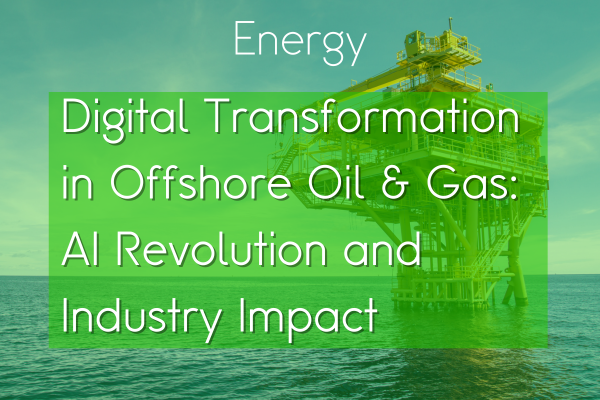Digital Transformation in Offshore Oil & Gas: AI Revolution and Industry Impact
27 Jan, 20252minsThe New Digital FrontierThe offshore oil and gas sector is experiencing a profound transform...

The New Digital Frontier
The offshore oil and gas sector is experiencing a profound transformation through artificial intelligence and digitalisation. As the AVEVA whitepaper reveals, organisations are now implementing integrated operational and carbon data management systems alongside AI analytics, marking a significant evolution in how offshore facilities operate.
Real-World Applications Transforming Operations
Recent industry developments have brought sophisticated operational capabilities:
Predictive Analytics Evolution
Nokia's recent implementations demonstrate how DWDM and IP/MPLS technologies are enabling quantum-safe networks that can handle massive data throughput for AI applications. These systems process millions of data points from offshore platforms in real-time, transforming operational decision-making.
Digital Twin Advancement
The industry has moved beyond basic modelling. As Seagems' CTO Fillipe Ferreira emphasises, companies are avoiding "tech-for-tech culture" by ensuring digital twins serve practical operational needs. These systems now integrate real-time sensor data with predictive modelling to optimise everything from drilling operations to maintenance schedules.
Operational Intelligence
Advanced AI-driven control systems can now autonomously adjust production parameters based on multiple variables, significantly improving efficiency and reducing operational risks. This capability represents a step-change in how offshore facilities are managed.
Critical Skills Gap and Workforce Evolution
Technical Requirements
The transformation has created demand for new specialist roles:
• Data Integration Specialists: Professionals bridging operational technology (OT) and information technology (IT), particularly crucial for hybrid cloud architectures with on-premises streaming analytics
• AI Operations Engineers: A new breed of professional combining traditional offshore engineering knowledge with AI expertise
• Digital Systems Architects: Specialists who can design and implement integrated digital platforms
Traditional Role Evolution
Established positions are being redefined:
• Control Room Operators: Now managing complex AI-driven decision support systems alongside traditional operational oversight
• Maintenance Engineers: Transitioning from scheduled maintenance to AI-driven predictive maintenance
• Process Engineers: Developing expertise in AI-enhanced optimisation techniques while maintaining core process knowledge
Infrastructure and Implementation
Technical Infrastructure
Organisations face significant challenges in building robust digital infrastructure:
• Network Optimisation: Implementing high-speed, reliable data networks capable of supporting real-time AI applications offshore
• Edge Computing: Deploying solutions to process critical data locally while managing bandwidth constraints
• Cybersecurity: Developing quantum-safe security protocols to protect increasingly connected operations
Implementation Strategy
Successful digital transformation requires:
1. Phased Integration
o Initial focus on high-impact, low-risk applications
o Gradual expansion to more complex systems
o Continuous evaluation and adjustment
2. Workforce Development
o Comprehensive training programmes for existing staff
o Strategic recruitment of digital specialists
o Development of hybrid teams combining traditional and digital expertise
Future Outlook
Emerging Trends
The sector is moving towards:
• Autonomous Operations: Increasing implementation of AI-driven autonomous systems
• Integrated Digital Ecosystems: Creating connected environments linking offshore and onshore operations
• Predictive Decision Making: Evolving from reactive to predictive operational models
Career Implications
This transformation is creating new career pathways:
• Digital Integration Specialists: Managing the integration of new digital systems with existing operations
• AI Safety Specialists: Ensuring AI systems operate within safety parameters
• Digital Training Specialists: Bridging the knowledge gap between traditional and digital operations
Recommendations for Industry Stakeholders
For Organisations
1. Strategic Planning
o Develop clear digital transformation roadmaps
o Invest in robust training and development programmes
o Build partnerships with technology providers and educational institutions
2. Talent Management
o Create clear career paths for digital roles
o Develop hybrid teams combining traditional and digital expertise
o Implement mentoring programmes to facilitate knowledge transfer
For Professionals
1. Skill Development
o Focus on developing hybrid skill sets
o Pursue continuous learning in digital technologies
o Maintain strong foundational knowledge in traditional operations
2. Career Planning
o Identify emerging roles and required competencies
o Build expertise in both technical and soft skills
o Develop change management capabilities
The digital transformation of offshore oil and gas represents a fundamental shift in operations, requiring a strategic approach to both technology implementation and workforce development. Success will depend on organisations' ability to effectively integrate new technologies while developing the necessary human capital to leverage these advances.


